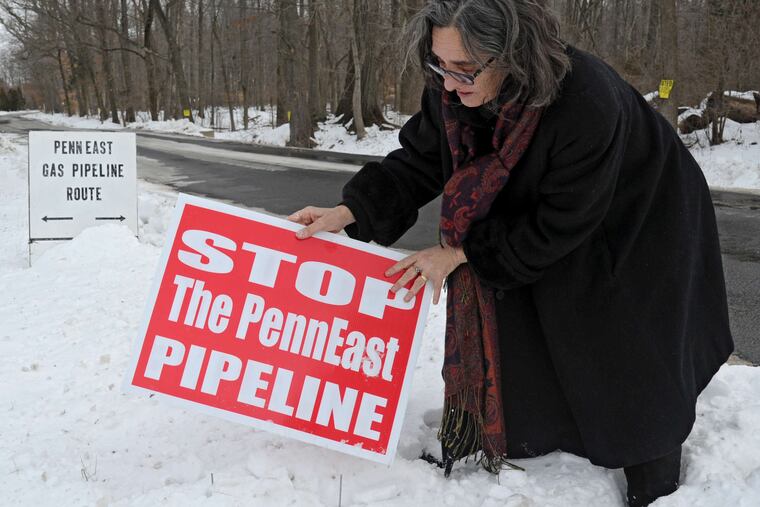Operators of contentious PennEast shale gas pipeline declare a retreat
The PennEast natural gas pipeline won a big U.S. Supreme Court victory in June. But the project is now in retreat, facing big legal and regulatory hurdles.

Just three months ago, the operators of the contentious PennEast Pipeline won an important U.S. Supreme Court victory allowing them to condemn land in New Jersey over the objections of state government. But in the boardrooms of the companies that engineered and financed the $1.2 billion natural gas project, they were not exactly exchanging high-fives.
The five companies that make up PennEast Pipeline Co. LLC met after the court decision and decided that even though they had won at the nation’s high court, the project still faced significant legal challenges and delays getting regulatory approvals and that their investments should be mostly written off.
Four of the five companies have told investors recently that their investments in PennEast were “impaired,” including New Jersey Resources Corp., South Jersey Industries Inc., the Southern Co. Inc., and a subsidiary of UGI Corp. of Valley Forge, the project operator. The four companies wrote off about $354 million from their books, nearly their entire investment in PennEast.
But they have not declared the project dead.
“This really does not change our belief that PennEast is an important project for the region, and that it’s a project that should be built,” Roger Perreault, president and chief executive of UGI, said at a quarterly earnings call in August. “And we certainly remain committed to the partnership agreement.”
But activists who have fought the project since it was first announced in 2014 did a victory dance this week after the New Jersey attorney general filed papers in federal court announcing that PennEast agreed to halt efforts to condemn 42 parcels in which the state claims a property interest. Most of the properties, which were the subject of the Supreme Court appeal, are privately owned land upon which New Jersey has granted conservation easements. Two are actually state lands.
“We really see this as a recognition that the writing is on the wall for this project,” said Tom Gilbert, campaign director for the New Jersey Conservation Foundation, which has long argued that the pipeline is unnecessary. “They’re claiming that they’re not abandoning the project, but actions speak louder than words.”
The PennEast project is among several fossil fuel pipelines that have run into stiff resistance from aggrieved property owners and climate activists, who have joined to rally political opposition to energy infrastructure projects. In New Jersey, the project was initiated while Republican Gov. Chris Christie was in office and received Federal Energy Regulatory Commission approval, which comes with the power to exercise eminent domain. But the project fell out of favor after the 2017 election of Gov. Phil Murphy, a Democrat, whose administration had promised to pursue a clean energy agenda.
The Supreme Court decision in June overturned a lower court ruling that blocked PennEast from exercising federal eminent domain authority over lands in which a state has property rights interests. But New Jersey said it intended to dispute condemnation proceedings, and the project would also still require state environmental permits.
PennEast says there is still a need for new energy supplies to New Jersey and Southeastern Pennsylvania, but acknowledged that the project is in retreat.
“Given the uncertainty on timing to resolve the remaining legal and regulatory hurdles, however, PennEast believes it is not prudent to complete the acquisition of the rights of way in the pending actions as it might not be necessary for some time,” the company’s spokesperson, Patricia Kornick, said in a statement.
“PennEast is exploring with attorneys representing landowners the idea of dismissing the actions without prejudice and restarting legal proceedings once it clears the regulatory hurdles and has a better understanding of when it would need to acquire the property interests,” the statement said.
PennEast was proposed to tie into Marcellus Shale natural gas fields in Northeastern Pennsylvania and deliver fracked shale gas on a 120-mile pipeline to the Trenton area, where it would feed power plants and tie into local utilities.
The pipeline’s partners included companies affiliated with several large gas utilities in the region: UGI Utilities, South Jersey Gas, New Jersey Natural Gas, and Public Service Electric & Gas. PSE&G’s parent sold its ownership share in 2017 to pipeline giant Enbridge Inc., which is the only member of the ownership group that did not report in recent months that it has written down the value of its investment.
Pipelines are still needed to provide natural gas for power generation and to the 75% of New Jersey households and half of Pennsylvania residences that use it to heat their homes, according to the Interstate Natural Gas Association of America, the trade group for the pipeline industry. “We need more natural gas infrastructure to meet these growing demands,” said Amy Andryszak, the association’s chief executive.
Jeff Tittel, the retired head of the New Jersey Sierra Club and another longtime PennEast opponent, said he is concerned that the industry will regroup and seek other avenues to expand gas deliveries to New Jersey.
He said that South Jersey Gas and New Jersey Natural Gas expanded their local distribution systems to accommodate gas that was expected to be delivered on PennEast. He fears that PennEast may seek a new path in New Jersey that would avoid protected state land, or may seek to expand the capacity of existing pipeline systems in Pennsylvania to bring greater volumes of fuel into the Garden State.
“This is a win for open space and protection of public lands, but it doesn’t mean we’re done yet,” Tittel said. “The Champagne is in the refrigerator, but we’re not ready to pop the cork yet.”